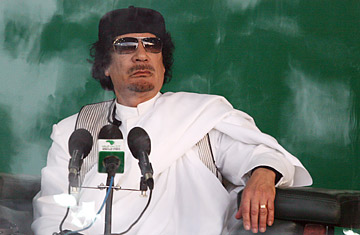
Libyan leader Moammar Gadhafi delivers a speech behind bullet proof glass, in Benghazi, Libya.
It's tempting to dismiss Libyan leader Col. Muammar Gaddafi's call this week for a jihad against Switzerland as just another round in the feud between the two countries. But it would be a mistake to treat Gaddafi's rhetoric as mere theater. Saif Al-Islam Gaddafi, the Libyan leader's second-eldest son, who many suspect is Gaddafi's likely successor, tells TIME that Libya's row with Switzerland is evidence of a far more serious and urgent issue within Libya, which is grappling with how democratic and Westernized the country should become after decades of isolation. "If we are going to dance with them [the West], we need to dance with the same rhythm to the same music," Saif Gaddafi said in a candid interview as he relaxed on his farm outside Tripoli, on the public holiday marking the Prophet Mohammed's birthday. "The best example is the Swiss crisis. It shows there is a big gap between our way of thinking and our mentality, and the Western mentality and the way of doing business."
That's an understatement. The senior Gaddafi's call on Friday for holy war against Switzerland has injected a new, more menacing tone into a dispute that has dragged on for the past 18 months. Gaddafi told an audience of diplomats and officials in the city of Benghazi that Muslims should bar Swiss planes and ships from their countries, and embargo Swiss goods. "Let us wage jihad against Switzerland, Zionism and foreign aggression," he told the crowd. "Any Muslim in any part of the world who works with Switzerland is an apostate, is against Muhammad, God and the Koran."
The rift, which threatens multi-billion-dollar investments in Libya, began when Swiss police arrested Gaddafi's youngest son Hannibal and his wife in July 2008, for allegedly assaulting two of their servants in a Geneva hotel. The couple denied the charges, which were quickly dropped, but the row continued. Offended by Swiss newspaper portrayals of his son, Gaddafi withdrew billions in Libyan funds from Swiss banks in July of last year, prompting the Swiss president to fly to Tripoli to apologize for the arrest.
Gaddafi was still not mollified. Last August, two Swiss businessmen were arrested in Tripoli for overstaying their visas. After a five-month standoff, one was allowed to leave Libya last week, while the second began a four-month prison term.
But Libya has not been the only one stoking the feud. On Feb. 14, Switzerland banned 188 Libyans including Col. Gaddafi himself, from entering its country. Libya immediately retaliated, freezing all visas of citizens belonging to the 25 European countries (including Switzerland) that belong to the continent's shared visa system, called Schengen. The dispute rose above personal issues into an affront against Islam in early February, when Swiss citizens voted in a national referendum to halt the construction of minarets.
In his interview with TIME, Saif did not criticize his father, to whom he is close. Yet he offered a head-on challenge to Libya's conservatives, who resist calls for democratic change. "They are idiots," he says, waving his hand as though to dismiss them. When asked what kinds of new political freedoms he wants for Libya — such as freedom of speech, or privately owned media — Saif replied without hesitating: "Everything — a level of freedom like in Holland." That would be a stunning departure from his father's 40-year rule, in which the country has carved a far different path from the West.
Saif was also blunt in criticizing Libyan officials who send mixed messages to the West, proclaiming the country a new ally and business partner of Europe and the United States, yet then resisting Western values. "Part of the problem is with the Libyan side. It's not enough for us to blame others," he says. "We are not serious enough, we are sending confusing messages." Sighing deeply, he said: "I think we are not ready to deal in the right way with the Western world, because they have different rules of the game."
The visa ban has certainly thrown investments in Libya's booming oil industry into question. When TIME visited Libya's major natural gas facility on Tuesday — it pipes gas to Italy under the Mediterranean — the company's Italian general manager, from the Italian energy company ENI, was not there. He was stuck in Europe, with no visa to return.
Libyan officials say the visa ban could last some time, in part because many applaud Gaddafi for his stand against Switzerland. "How could the Swiss put 188 names on this list [of Libyans banned from the country] including the Leader of the Revolution?" asks Abdul Majeed el-Dursi, director of the government's press office for foreign journalists. "This is something which is done to criminals. I think it will continue until they [Switzerland] comes to their senses."
